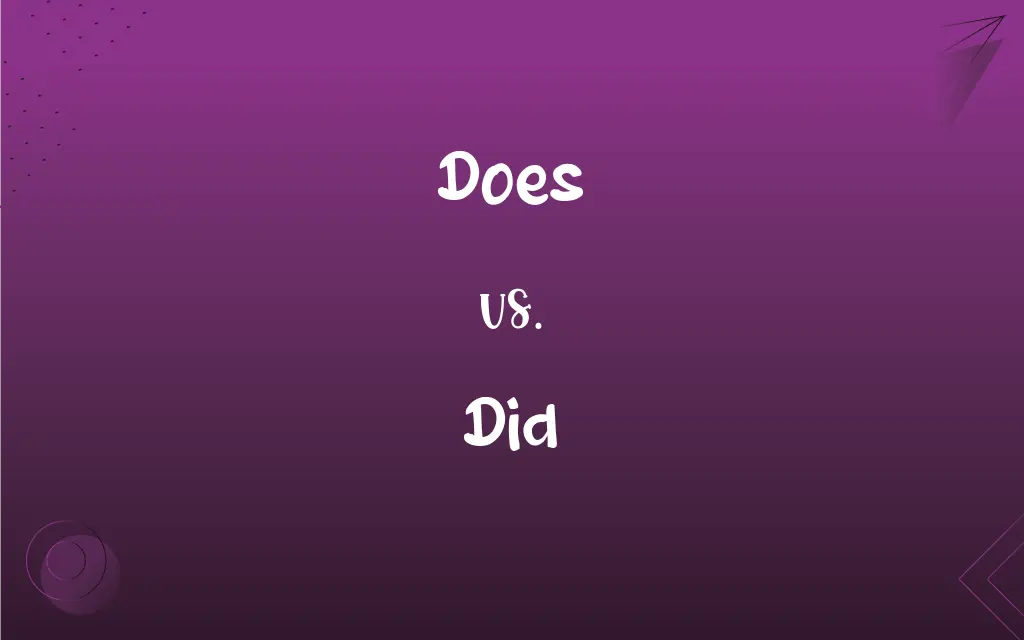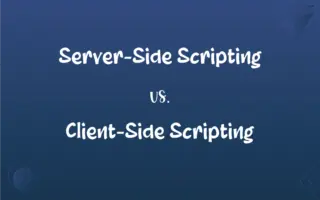Does vs. Did: What's the Difference?
Edited by Aimie Carlson || By Janet White || Published on February 17, 2024
"Does" is the present tense form of "do," used for singular subjects, while "did" is the past tense form used for all subjects.

Key Differences
Does is the present tense, third-person singular form of the verb "do," used with singular subjects like he, she, or it. For example, "She does her homework daily." It signifies an action that is currently happening or regularly occurs. In contrast, Did is the simple past tense of "do," used for all subjects (I, you, he, she, it, we, they). For instance, "They did their chores yesterday," indicating an action that was completed in the past.
Does is often used in the present simple tense to describe habitual actions or general truths, such as "The sun does rise in the east." It's also commonly used in questions and negatives, for example, "Does he understand the rules?" Did, on the other hand, is used in the past simple tense for actions completed at a specific time in the past. It is also used in questions and negatives, like "Did you go to the store?"
In questions and negative statements, does serves as an auxiliary verb, helping to invert the subject and main verb for questions, or to add 'not' for negations. For example, "Does she like pizza?" or "He does not want to go." Did is used similarly in the past tense, as in "Did they arrive on time?" or "She did not see the movie."
Does is used with singular nouns or third-person singular pronouns, implying a present action or state. It's also used for emphasis in affirmative statements, like "She does love that song." Whereas, Did is used with all subjects, regardless of number, to discuss past actions or states. It can also provide emphasis in past tense statements, as in "I did warn you about the risks."
Does can be used in present subjunctive forms, especially in formal contexts or fixed expressions, such as "It is essential that he does his duty." In contrast, Did is often used in reported speech or conditional sentences to refer to past actions, like "He said he did his best."
ADVERTISEMENT
Comparison Chart
Tense
Present
Past
Subject Agreement
Third person singular (he, she, it)
All subjects (I, you, he, she, it, we, they)
Example Usage
"She does work on weekends."
"They did visit the museum."
Auxiliary Use
In questions & negatives: "Does he know?"
In questions & negatives: "Did you see?"
Emphasis
Can add emphasis in present: "He does play well."
Can add emphasis in past: "She did try her best."
ADVERTISEMENT
Does and Did Definitions
Does
To suffice or be suitable.
This does fit the criteria.
Did
To complete or accomplish.
He did the task before noon.
Does
To perform or execute.
She does a great job.
Did
To visit or explore.
I did Paris during my vacation.
Does
Present tense of do for singular subjects.
He does his homework every evening.
Did
Past tense of do for all subjects.
They did their best in the competition.
Does
To travel or journey.
She does 20 miles daily on her bike.
Did
To perform or execute in the past.
She did a play last year.
Does
To create or produce.
He does amazing artwork.
Did
To experience or undergo.
They did feel better after the news.
Does
Third person singular present tense of do1.
Did
Past tense of do1.
Does
Plural of doe
Did
Past participle of do
FAQs
What is the basic function of does?
Does is the present tense form of "do" for singular subjects.
Does does have a past tense form?
The past tense of does is did.
Is does used for plural subjects?
No, does is used with singular third-person subjects.
Can does be used in questions?
Yes, does is often used in present tense questions.
Can did indicate a completed action?
Yes, did typically indicates a past, completed action.
Is did ever used in the present tense?
No, did is exclusively a past tense form.
Is does used for habitual actions?
Yes, does denotes regular or habitual actions.
Can did be used for emphasis?
Yes, did can emphasize past actions.
How is does used in negative sentences?
Does is used with not in present tense negatives.
How is did used in indirect speech?
Did is used to report past statements or questions.
Can does be replaced with did in a sentence?
No, they belong to different tenses and subjects.
Can did be used with singular subjects?
Yes, did is used with both singular and plural subjects.
Is does suitable for all verb forms?
Does is used with base forms of verbs in present tense.
What is the basic function of did?
Did is the past tense form of "do" for all subjects.
Is did used in past tense questions?
Yes, did is commonly used in past tense questions.
Does does have a negative form?
Yes, as in "She does not know."
Can did be used to express regret?
Yes, often in the structure "I wish I did..."
Is does used in formal writing?
Yes, does is appropriate in formal contexts.
Does does imply current action?
Yes, does refers to present actions or states.
Is did used in informal speech?
Yes, did is common in both formal and informal speech.
About Author
Written by
Janet WhiteJanet White has been an esteemed writer and blogger for Difference Wiki. Holding a Master's degree in Science and Medical Journalism from the prestigious Boston University, she has consistently demonstrated her expertise and passion for her field. When she's not immersed in her work, Janet relishes her time exercising, delving into a good book, and cherishing moments with friends and family.
Edited by
Aimie CarlsonAimie Carlson, holding a master's degree in English literature, is a fervent English language enthusiast. She lends her writing talents to Difference Wiki, a prominent website that specializes in comparisons, offering readers insightful analyses that both captivate and inform.































































